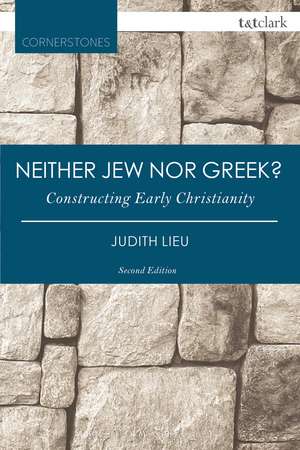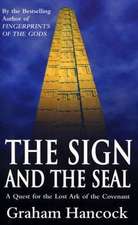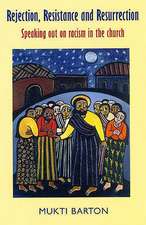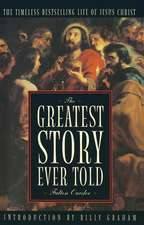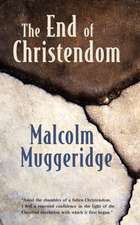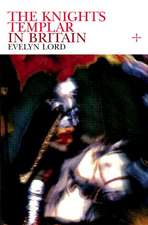Neither Jew nor Greek?: Constructing Early Christianity: T&T Clark Cornerstones
Autor Judith Lieuen Limba Engleză Paperback – 18 noi 2015
Din seria T&T Clark Cornerstones
- 13%
 Preț: 182.65 lei
Preț: 182.65 lei - 11%
 Preț: 249.24 lei
Preț: 249.24 lei - 13%
 Preț: 183.54 lei
Preț: 183.54 lei -
 Preț: 125.65 lei
Preț: 125.65 lei -
 Preț: 127.81 lei
Preț: 127.81 lei - 14%
 Preț: 179.56 lei
Preț: 179.56 lei - 13%
 Preț: 181.77 lei
Preț: 181.77 lei - 11%
 Preț: 262.87 lei
Preț: 262.87 lei - 25%
 Preț: 180.44 lei
Preț: 180.44 lei - 13%
 Preț: 181.77 lei
Preț: 181.77 lei - 12%
 Preț: 245.54 lei
Preț: 245.54 lei - 14%
 Preț: 179.10 lei
Preț: 179.10 lei - 14%
 Preț: 178.65 lei
Preț: 178.65 lei - 12%
 Preț: 185.33 lei
Preț: 185.33 lei - 13%
 Preț: 181.32 lei
Preț: 181.32 lei - 13%
 Preț: 181.77 lei
Preț: 181.77 lei -
 Preț: 250.23 lei
Preț: 250.23 lei -
 Preț: 172.59 lei
Preț: 172.59 lei - 23%
 Preț: 171.39 lei
Preț: 171.39 lei - 12%
 Preț: 240.98 lei
Preț: 240.98 lei
Preț: 181.77 lei
Preț vechi: 209.44 lei
-13% Nou
Puncte Express: 273
Preț estimativ în valută:
34.79€ • 37.77$ • 29.22£
34.79€ • 37.77$ • 29.22£
Carte tipărită la comandă
Livrare economică 22 aprilie-06 mai
Preluare comenzi: 021 569.72.76
Specificații
ISBN-13: 9780567658814
ISBN-10: 0567658813
Pagini: 284
Dimensiuni: 156 x 234 x 20 mm
Greutate: 0.5 kg
Ediția:Revised
Editura: Bloomsbury Publishing
Colecția T&T Clark
Seria T&T Clark Cornerstones
Locul publicării:London, United Kingdom
ISBN-10: 0567658813
Pagini: 284
Dimensiuni: 156 x 234 x 20 mm
Greutate: 0.5 kg
Ediția:Revised
Editura: Bloomsbury Publishing
Colecția T&T Clark
Seria T&T Clark Cornerstones
Locul publicării:London, United Kingdom
Caracteristici
Lieu is a leading name in the field and holds one of the field's most prestigious chairs
Notă biografică
Judith Lieu is Lady Margaret's Professor of Divinity at the University of Cambridge, UK.
Cuprins
PrefaceAbbreviations1. Introduction: Neither Jew nor Greek? Constructing Early ChristianityPart I: Disappearing Boundaries2. 'The Parting of the Ways': Theological Construct or Historical Reality?3. Do God-fearers make Good Christians?4. The Race of the God-Fearers5. Ignoring the CompetitionPart II. Women and Conversion in Judaism and Christianity6. The 'Attraction of Women' in/to Early Judaism and Christianity: Gender and the Politics of Conversion7. Circumcision, Women and SalvationPart III: Theology and Scripture in Early Christian Views of Judaism8. History and Theology in Christian Views of Judaism9. Accusations of Jewish persecution in Early Christian Sources10. Reading in Canon and Community: Deut. 21.22-23, A Test Case for DialoguePart IV: The Shaping of Early 'Christian' Identity11. The Forging of Christian Identity and the Letter to Diognetus12. The New Testament and Early Christianity13. 'I am a Christian': Martyrdom and the Beginning of Christian IdentityBibliographyGeneral IndexIndex of Modern Authors
Recenzii
[A] wonderfully learned volume, Judith Lieu's capacity to hold together biblical, Jewish and patrisitc material commands respect, and she is an authority on the borderland between early Christianity and Judaism
Anyone interested in early Christian origins would be well advised to read this text. Lieu is a very careful biblical historian, marshaling a range of evidence while also able to acknowledge the limitations and ambiguity of some of this evidence.
This is a helpful collection which focuses on a broadly coherent theme. The essays are wide-ranging and show up their author's broad and detailed knowledge of both primary and secondary material. One is given a strong sense of the complexity of the subjects under discussion, not least because of the difficulty we encounter in dealing with texts (and it is texts with which Lieu is primarily concerned) with such a heavy rhetorical aspect- in fact much of what Lieu presents us with are a gradual unveiling of problems. We should, however, be grateful to have this erudite collection so easily available to us, not least because of the many issues and problems with which it presents its reader.
Anyone interested in early Christian origins would be well advised to read this text. Lieu is a very careful biblical historian, marshaling a range of evidence while also able to acknowledge the limitations and ambiguity of some of this evidence.
This is a helpful collection which focuses on a broadly coherent theme. The essays are wide-ranging and show up their author's broad and detailed knowledge of both primary and secondary material. One is given a strong sense of the complexity of the subjects under discussion, not least because of the difficulty we encounter in dealing with texts (and it is texts with which Lieu is primarily concerned) with such a heavy rhetorical aspect- in fact much of what Lieu presents us with are a gradual unveiling of problems. We should, however, be grateful to have this erudite collection so easily available to us, not least because of the many issues and problems with which it presents its reader.
